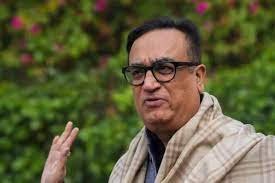
Congress treasurer Ajay Maken has accused the Income Tax Department of undemocratically withdrawing ₹65 crore from the party’s accounts with various banks, despite the issue of Congress’s income tax payments being sub judice. Maken’s statement comes amidst escalating tensions between the party and tax authorities over a disputed tax demand of ₹210 crore.
Highlighting the disparity in treatment between political parties, Maken questioned whether it is common practice for national political parties like the Bharatiya Janata Party (BJP) to pay income tax. He asserted that the BJP does not pay income tax, raising concerns about the unprecedented demand faced by the Congress party. The matter was discussed during proceedings at the Income Tax Appellate Tribunal (ITAT), with hearings set to continue.
According to Maken, the Income Tax Department withdrew ₹60.25 crore from three of Congress’s bank accounts through demand drafts, and an additional ₹5 crore from the accounts of the Indian Youth Congress. The funds in question were reportedly raised through grassroots efforts, including crowdfunding and membership drives by the Indian Youth Congress and the National Students’ Union of India (NSUI).
The withdrawal of funds by the Income Tax Department followed the freezing of Congress’s main bank accounts on February 16, in response to an income tax demand of ₹210 crore. However, an ITAT ruling allowed the main account to function pending further hearings, scheduled for Thursday.
Vivek Tankha, representing Congress before the tribunal, emphasized the party’s inability to participate in elections if its accounts remained frozen. The situation underscores the heightened tensions between Congress and tax authorities, with the issue of income tax payments becoming a subject of legal dispute.
The Income Tax Department’s move to withdraw funds from Congress’s accounts while the matter remains sub judice has raised concerns about the fairness and transparency of the proceedings. The development also highlights broader questions about the state of democracy and the treatment of political parties in India’s political landscape.
Sources By Agencies

